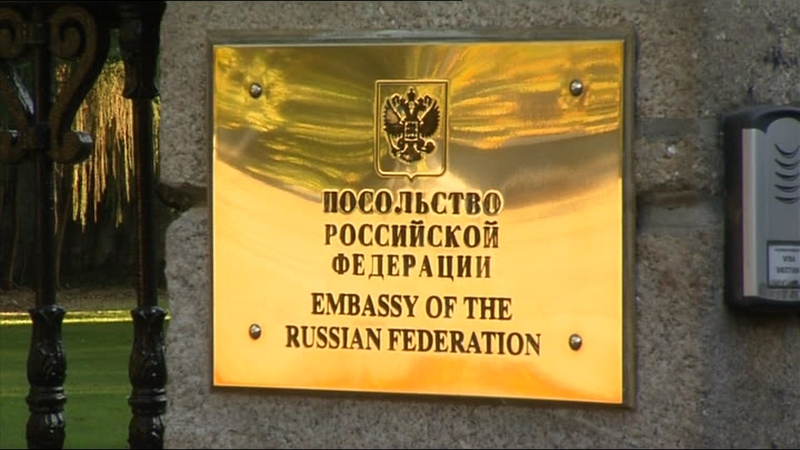Welcome to DU!
The truly grassroots left-of-center political community where regular people, not algorithms, drive the discussions and set the standards.
Join the community:
Create a free account
Support DU (and get rid of ads!):
Become a Star Member
Latest Breaking News
Editorials & Other Articles
General Discussion
The DU Lounge
All Forums
Issue Forums
Culture Forums
Alliance Forums
Region Forums
Support Forums
Help & Search
OnDoutside
OnDoutside's Journal
OnDoutside's Journal
March 30, 2018
https://www.joe.ie/news/america-visa-social-media-620827
Anyone travelling to America will need to submit their social media accounts before entering
I'm shocked this isn't a big international story
They'll also need to give current and previous email addresses and phone numbers. It was revealed on Thursday that the State Department in the U.S. would be seeking all visa applicants to the country to submit their social media accounts along with their visa applications. Along with this, they will also be required to submit all of their email addresses and phone numbers for the last five years.
According to the New York Times, these new additions to the visa applications will be published in Friday's Federal Register and the State Department has said it wants the public to comment on the proposed new requirements. Previously, these requirements were only asked of specific applicants who were placed under additional scrutiny, such as those who have travelled to areas that are controlled by terrorist organisations.
This usually involved around 65,000 people per year, but with the new expansion of the additions, that number will go up to approximately 15 million people every year. If the new documents are approved, then all visa applicants will need to present a list of their social media platforms - Facebook, Twitter, Instagram, etc. - and provide the account names for each of those, as well as any previous accounts they may have had in the last five years.
https://www.joe.ie/news/america-visa-social-media-620827
March 27, 2018

https://www.rte.ie/news/world/2018/0327/950312-salisbury/
Ireland to expel Russian diplomat over UK nerve agent attack

The Irish Government has said that a Russian diplomat is to be expelled over the nerve attack in Salisbury, England earlier this month.
In a statement, Tánaiste and Minister for Foreign Affairs Minister Simon Coveney said the Russian Ambassador to Ireland has been told that the "accreditation of a member of his staff with diplomatic status is to be terminated".
This person is required to leave Ireland.
Mr Coveney said the attack in Salisbury was "an affront to the international rules-based system on which we all depend for our security and wellbeing".
Mr Coveney spoke with British Foreign Secretary Boris Johnson last night and said that Ireland will be acting in solidarity with the UK.
Ireland has joined 16 EU members states, the United States, Canada and Australia, along with Britain, in expelling more than 100 Russian diplomats in response to the attack on former double agent Sergei Skripal and his daughter on 4 March.
https://www.rte.ie/news/world/2018/0327/950312-salisbury/
March 26, 2018
Bill Mitchell attacks David Hogg, and David + Cameron Kasky respond !
read thread
https://twitter.com/mitchellvii/status/977852761038643200
https://twitter.com/cameron_kasky/status/978241766741725184
https://twitter.com/cameron_kasky/status/978241902440013824
https://twitter.com/davidhogg111/status/978242161845112832
https://twitter.com/cameron_kasky/status/978243357796392961
March 26, 2018
What's your favourite Easter Egg ?
Two of my favourites this year are

and

but it's generally hard to look past Cadbury's eggs in general, like



March 25, 2018
More at
https://www.theguardian.com/technology/2018/mar/24/facebook-week-of-shame-data-breach-observer-revelations-zuckerberg-silence
Facebooks week of shame: the Cambridge Analytica fallout
Mark Zuckerberg kept his silence – then did little to assuage the anger in a week that laid bare the worst of Silicon Valley
Every story has a beginning. For me, the story of Cambridge Analytica and Facebook that has unfolded so spectacularly this past week began in a cafe in Holloway, north London, at the beginning of 2017.
I was having a coffee with my colleague Carole Cadwalladr. She had recently written a series of articles that set out how certain Google search terms had been “hijacked by the alt-right”. In the course of that investigation she explained how she had come across another pattern of activity apparently linking the Trump and Leave.EU campaigns, one that appeared to involve the billionaire Robert Mercer, Steve Bannon – then of Breitbart – and a secretive British company called Cambridge Analytica. She laid out the elements of what she knew, and what she didn’t, testing her conviction that “there’s definitely something there”.
snip
In a way, that was only the warm-up act of the story. Nix’s unwitting confessions were in marked contrast to the silence from Facebook’s chief executive Mark Zuckerberg. All anyone knew of Facebook’s response on Monday was that it had a swat team of data analysts working overnight at Cambridge Analytica’s offices – though that same data remained out of bounds for the government’s information commissioner, Elizabeth Denham, who was trying in vain to get a warrant to access files before they were potentially compromised. Zuckerberg declined to face his own employees at a meeting on Tuesday, while again a press statement from his PR team suggested that “the entire company is outraged we were deceived”. The continued silence seemed to tell another story, however, not least to Wall Street; in those two days nearly $60bn was wiped off the Facebook market capitalisation, and #whereszuck became a top-trending social media meme. As the silence persisted, a little of Zuckerberg’s public relations dilemma became clear. The original legal threat to the Observer was over the question of whether the 50 million profiles handed first to the Cambridge academic Aleksandr Kogan and then sold on to Cambridge Analytica constituted a data breach. Facebook insisted that it did not, but that insistence itself amounted to a public acknowledgement of a business model that appeared to allow the unauthorised sale of private data.
When Zuckerberg did eventually come out to try to explain this, his crafted statement was another effort to make the exploitation of the 50 million profiles seem like a technical problem, a glitch. His tone was the default position of T-shirted Silicon Valley plutocrats who insist that they are on our side, while squirrelling away their billions. What had happened was not a data breach “but a breach of trust”, he suggested, a sentiment he repeats in a personal advertisement in today’s newspapers, including the Observer.
This appeal to Facebook users’ faith in its better nature recalled an infamous recorded exchange from the early days of Facebook at Harvard, when Zuckerberg was in conversation with a friend.
Zuck: “Yeah so if you ever need info about anyone at Harvard, just ask. I have over 4,000 emails, pictures, addresses, SNS.”
Friend: “What? How’d you manage that one?”
Zuck: “People just submitted it. I don’t know why. They ‘trust me’. Dumb fucks!”
snip
Last week even the Economist was persuaded of the need for Facebook in particular to make radical changes to its data practices, or for governments to call time on its model. “If Facebook ends up as a regulated utility with its returns on capital capped, its earnings may drop by 80%. How would you like that, Mr Zuckerberg?”. When faced with the often anonymised global entity of the internet, it has been easy to buy the argument that the forces at work in it are too opaque and complex to hold to account. What the Cambridge Analytica revelations bring to light – through old-fashioned journalistic persistence – is that those forces are, in fact, open to the same kinds of manipulation and corruption that any media needs protection from, but on a far greater scale. The story has given the growing unease about the unaccountable empire-building of Silicon Valley tech companies an all-too-human set of faces. It may not be a pretty sight, but it is not one that will be easily forgotten.
More at
https://www.theguardian.com/technology/2018/mar/24/facebook-week-of-shame-data-breach-observer-revelations-zuckerberg-silence
March 23, 2018
more : https://www.independent.ie/irish-news/politics/ireland-will-stand-by-its-allies-taoiseach-responds-to-criticism-that-assessing-russian-ambassadors-is-unfriendly-action-36735761.html
'Ireland will stand by its allies' - Taoiseach responds to criticism that assessing Russian ambass.
'Ireland will stand by its allies' - Taoiseach responds to criticism that assessing Russian ambassadors is 'unfriendly action'Ireland is standing by our EU allies by embarking on a detailed security assessment of unauthorised Russian agents here, Taoiseach Leo Varadkar has said.
Russian Ambassador to Ireland Yury Filatov warned that any effort to expel diplomats would be seen as an "unfriendly action" but Taoiseach Varadkar said Ireland must stand by our EU allies as the fallout from the nerve agent attack in England continues.
Speaking in Brussels, Mr Varadkar said: "We’re part of a European Union which has 28 member states in it. "Other member states are sometimes subject to attack; we saw a terrible attack today in France and last week an attempted assassination using a chemical agent occurred in England.
"Part of the European Union and part of European solidarity is the 28 of us standing together; so if an unfriendly act is perpetrated on one European country; other European countries will stand together and stand by our allies and that’s what we would expect for us and it’s what we will do for other countries."
snip
"What we will now consider in the coming days is to whether we want to take individual action relating to Russian diplomats in Ireland, bearing in mind that what the UK did was to expel 23 diplomats who they believed, were not actually diplomats, were agents," he said. "So we would have to do a security assessment just like they did before that, we are not going to randomly expel people who are genuine diplomats. "A security assessment will be done. The minister for Foreign Affairs Tanaiste (Simon Coveney) and I already spoke about this, in the coming days so we will make that decision I would say the early part of next week."
snip
Foreign affairs minister Simon Coveney outlined the next steps for the Government. "The UK is Ireland’s closest neighbour and friend and we are in complete solidarity with the British government as they deal with the circumstances and consequences of this appalling attack," Mr Coveney said. "Ireland shares the UK and European Council assessment that it is highly likely that the Russian Federation is responsible and that there is no plausible alternative explanation. The use of chemical weapons in any circumstances is completely unacceptable.
more : https://www.independent.ie/irish-news/politics/ireland-will-stand-by-its-allies-taoiseach-responds-to-criticism-that-assessing-russian-ambassadors-is-unfriendly-action-36735761.html
March 19, 2018
This is the first episode of the TV series (more on youtube). It's just been commissioned for a second series.
The Young Offenders
This was originally a low budget movie based in my city Cork, Ireland, but BBC picked it up and made it into a tv series.
The movie trailer
This is the first episode of the TV series (more on youtube). It's just been commissioned for a second series.
March 18, 2018
Full article at
https://www.independent.ie/world-news/europe/ireland-on-the-front-line-in-russias-new-hacking-war-36716589.html
Ireland on the front line in Russia's new hacking war
The use of a rare military grade nerve agent in the attempted assassination of Sergei Skripal in England was a deliberately provocative move by Moscow. The Russian government knew that blame for the attack would quickly be laid at the Kremlin's door. The West would be outraged, diplomats expelled, and further sanctions imposed. President Putin's regime wants us to think that they do not care. The point of the attack was to send a message to the West: if we are capable of using chemical weapons in the UK, then tread lightly in future when it comes to Ukraine, Syria and the recruitment of intelligence agents, assistance to dissidents in Russia.
What if anything does this have to do with Ireland? The answer is that Ireland, too, is already under attack from Russia. Irish cyber security analysts have noted a significant escalation in Russian cyber attacks on the Irish public and private sector alike. This is part of a wider general pattern of increased Russian intelligence activity in Ireland. Moscow abides by few if any rules when it comes to espionage. Critical national infrastructure - health, water, electricity services - is increasingly at risk, as the Russian state-linked cyber attack on ESB demonstrated last year. Ciaran Martin, the Northern Irish head of the UK National Cyber Security Centre (NCSC), has warned that a Category One (C1) attack - crippling an area of critical national infrastructure for a period - is highly probable in the next few years. Responding to and containing a C1 attack on the UK will be a significant challenge for both states. The risk of contagion is obvious.
Ireland is an important cyber battlefield between Russia and the West. Some of the most sophisticated software companies in the world are based here, producing technology that is invested in and utilised by governments and businesses from around the world. Russia wants to hack these companies to steal secrets that gives it an advantage in the escalating cyber war. Ireland is not only a technology hub but it is also the fibre-optic bridge for superfast internet cables between North America and Europe; the protection of these cables in Irish waters is a matter of increasing concern to our Nato allies.
snip
Ireland must also have the capacity to keep intelligence received from foreign partners secure - doubts persist in the US and in Europe about whether Ireland has the security infrastructure to do so, limiting the extent of intelligence that foreign governments will share. But the State also has sensitive policy differences relating to on-going discussions with even its closest allies such as the UK. These must remain secret. The Garda Crime and Security Branch has won a reputation at home and abroad for resourcefulness and tenacity. But ultimately specialised units such as Security and Intelligence and the National Cyber Crime Bureau are relatively starved of resources compared with many similarly sized European countries. The Government should also move to introduce a National Security Bill, articulating its case for increased security vigilance and more effective oversight (including by the judiciary) over the national intelligence function. All these measures will require a modest investment of political and fiscal capital. But the dividends are critically important: nothing less than the measure of Irish sovereignty in the 21st Century is at stake.
Full article at
https://www.independent.ie/world-news/europe/ireland-on-the-front-line-in-russias-new-hacking-war-36716589.html
Profile Information
Gender: Do not displayHome country: Ireland
Current location: Ireland
Member since: Mon May 23, 2016, 04:42 AM
Number of posts: 20,246

